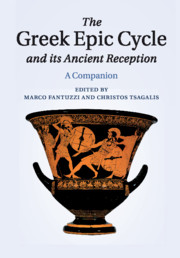Book contents
- Frontmatter
- Contents
- List of illustrations
- List of contributors
- Editorial note
- Introduction: Kyklos, the Epic Cycle and Cyclic poetry
- PART I APPROACHES TO THE EPIC CYCLE
- PART II EPICS
- 11 Theogony and Titanomachy
- 12 Oedipodea
- 13 Thebaid
- 14 Epigonoi
- 15 Alcmeonis
- 16 Cypria
- 17 Aethiopis
- 18 Ilias parva
- 19 Iliou persis
- 20 Nostoi
- 21 Telegony
- PART III THE FORTUNE OF THE EPIC CYCLE IN THE ANCIENT WORLD
- Works cited
- Index of principal passages
- Index nominum et rerum
21 - Telegony
from PART II - EPICS
Published online by Cambridge University Press: 05 August 2015
- Frontmatter
- Contents
- List of illustrations
- List of contributors
- Editorial note
- Introduction: Kyklos, the Epic Cycle and Cyclic poetry
- PART I APPROACHES TO THE EPIC CYCLE
- PART II EPICS
- 11 Theogony and Titanomachy
- 12 Oedipodea
- 13 Thebaid
- 14 Epigonoi
- 15 Alcmeonis
- 16 Cypria
- 17 Aethiopis
- 18 Ilias parva
- 19 Iliou persis
- 20 Nostoi
- 21 Telegony
- PART III THE FORTUNE OF THE EPIC CYCLE IN THE ANCIENT WORLD
- Works cited
- Index of principal passages
- Index nominum et rerum
Summary
The Telegony (Τηλεγονία or Τηλεγόνεια) by Eugammon of Cyrene in two books brings the Epic Cycle to an end. Our knowledge of its content is largely, but not solely, based on the summary of Proclus, with Ps.-Apollodorus offering some supplementary information that should be treated with caution. The Telegony poses various problems for anyone wishing to reconstruct its plot, the more so since the three principal critical editions available significantly differ with respect to the number of fragments they ascribe to the actual poem. Having said this, I will offer my own classification of the relevant fragments and discuss them in due course.
Plot
After the burial of the suitors by their relatives, Odysseus sacrifices to the Nymphs and sails off to Elis in order to inspect his oxen-stables there. Polyxenus, who supervises his stables, offers him hospitality and gives him a bowl as a gift. The epic must have departed on a digression at this point, featuring an extended ekphrasis with respect to the story of Trophonius, Agamedes, and Augeas. After the completion of his inspection, Odysseus sails back to Ithaca and carries out the sacrifices Teiresias had told him to perform. He then travels to the land of the Thesprotians. After marrying Callidice, queen of the Thesprotians, Odysseus becomes king and decides to stay there. He has a son with her, whose name is Polypoites. When a war breaks out between the Thesprotians and the Brygians he leads the Thesprotian army but fails to defeat the enemy. Ares and Athena support the Brygians and the Thesprotians respectively, but it is Apollo who brings the war to an end by calling for a truce. After Callidice's death, Odysseus gives the throne to Polypoites and returns to Ithaca. It is at this point that Telegonus, who has been told by his mother Circe that he is the son of Odysseus, arrives at Ithaca in search of his father and ravages the island. Odysseus tries to avert the danger but is killed by the ignorant Telegonus, who uses as a weapon a spear barbed with the spine of a sting-ray. When he realizes that he has killed his own father, Telegonus laments and brings the body of Odysseus together with Telemachus and Penelope to Aeaea, Circe's island. Then, Telegonus is married to Penelope and Telemachus to Circe, who makes them all immortal.
- Type
- Chapter
- Information
- The Greek Epic Cycle and its Ancient ReceptionA Companion, pp. 380 - 402Publisher: Cambridge University PressPrint publication year: 2015
- 1
- Cited by



